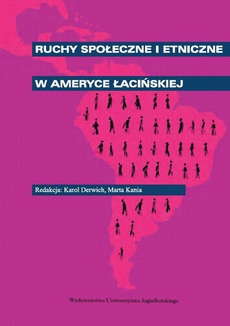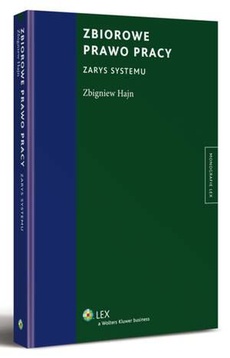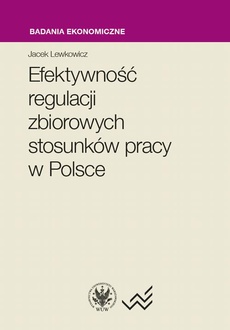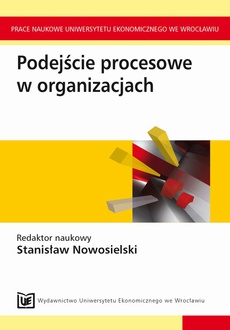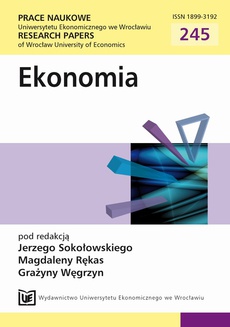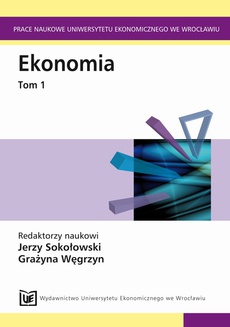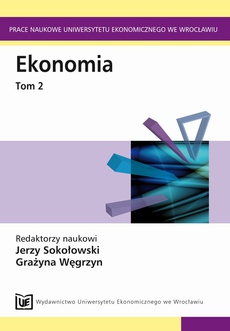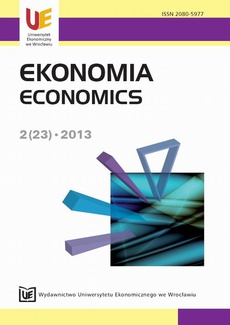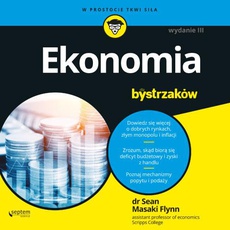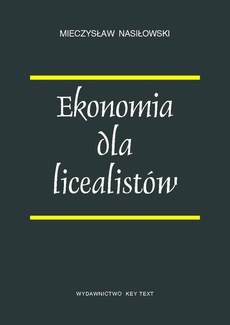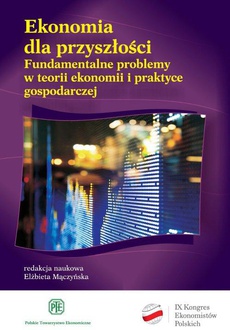INNE EBOOKI AUTORA
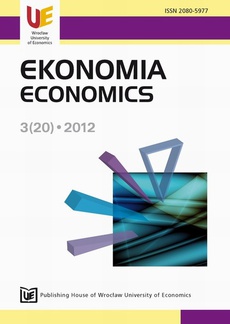
Ekonomia 3(20)
Economics
Praca zbiorowa
Format:
ibuk
In this issue of the journal Economics, seven articles connected with Asian studies are published, in which the authors consider selected economic and social problems in the Asia-Pacific region.
The publication opens with the article by Bogusława Skulska and Sebastian Bobowski entitled “Clustering in East Asia – implications of Japan’s industrial development model”. The authors present the phenomenon of clustering, which – driven by the open, liberal course of regional economies in East Asia – has contributed to the massive inflow of foreign direct investment and to the formation of networks involving local small and medium enterprises (SMEs), the birthplace of which was Japan. The traditional orientation of industrial policy on competitiveness has been replaced by an orientation on innovation, which contributed to the dynamic development of the countries located in this region.
The importance of cluster development for the economies of both developed (Japan) and emerging (China) countries in East Asia is also seen by Anna Jankowiak in the paper “The specificity of clusters in the Asian economies”. The author emphasises correctly that they contribute to improved competitiveness, increased innovation, and new products, businesses and jobs creation. Clusters, with their characteristics, combine the activities of entrepreneurs, government and scientific entities, thus contribute to the rapid growth of local economies and create links between them. Therefore, they are a very important factor in shaping contemporary Asian regionalism.
The transformation of Asian regionalism using the example of the ASEAN is the point of interest of Karolina Klecha-Tylec, who in the article entitled “ASEAN towards the transformation of East Asian regionalism” presents the activities undertaken by the Association of Southeast Asian Nations member states in order to maintain their important role in East Asia. Today, these countries, despite their enormous economic and political diversity, face the necessity of taking joint action to prevent their marginalisation (not only in regional relations, but also on the global scale).
In the article by Susanne Rodemeier under the inspiring title “‘Everyone is a potential leader’. Attractiveness of a charismatic Church in Solo, Java (Indonesia)” we find reflections on the Church’s influence on the organisation of the society in Solo, on the island of Java (Indonesia). The author shows in how many ways the role of an individual in society can be perceived in various Churches, and also tries to answer the question: What factors caused the local population to be increasingly interested in the activities of the Family of God Church?
The presentation of the non-material contribution of India to the global development aid system is made by Marcin Nowik in the article “Development policy in India – between theory and practice”. The author points out that today India – as a developing country – is not just a donor but also an active player in the area of aid concept development. The country does not only implement externally imposed economic policy, but also modifies it according to its own local needs and participates in its creation on a partnership basis.
The alternative investment market may constitute an advantageous proposition as a place of capital location in times of the global financial crisis. Magdalena Broszkiewicz, in the article “Alternative investment in China a solution for investment at the time of modern financial crisis”, shows that because of the favourable economic situation and projections of markets’ growth (including capital markets) in the Asia-Pacific region, the location is worth the investment. She emphasises that China’s market is particularly interesting because of a variety of alternative investments (real estate, wine, jewellery, agricultural raw materials) and the high savings rate of Chinese society. It is now believed that the most important alternative investment in China is gold.
The significance of the outward foreign direct investment promotion for emerging markets is the subject of the article by Aleksandra Kuźmińska-Haberla, entitled: “Promotion of outward FDI in emerging markets – the example of South Korea”. The author, on the basis of an analysis of policies and instruments of Korean foreign investment promotion, notes that they bring benefits to a country’s economic growth. She also indicates that the solutions used in South Korea could be employed in Polish conditions.
The diversity of the issues presented in the articles should increase the attractiveness of the recommended publication, which as a consequence will give the authors of individual studies a chance to verify the results of their research through the opinion of the most important reviewers, i.e. the readers.
In providing the readers with this volume of the journal, containing papers devoted to Asian studies, I hope that the contents will be an inspiration for further research and will popularise the subject matter.
| Rok wydania | 2012 |
|---|---|
| Liczba stron | 96 |
| Kategoria | Publikacje darmowe |
| Wydawca | Wydawnictwo Uniwersytetu Ekonomicznego we Wrocławiu |
| Numer wydania | 1 |
| Język publikacji | angielski |
| Informacja o sprzedawcy | ePWN sp. z o.o. |
POLECAMY
Ciekawe propozycje
Spis treści
| Introduction | 7 |
| Sebastian Bobowski, Bogusława Skulska: Clustering in East Asia – implications of Japan’s industrial development model | 9 |
| Anna H. Jankowiak: The specificity of clusters in the Asian economies | 22 |
| Karolina Klecha-Tylec: ASEAN in view of the transformation of East Asian regionalism | 33 |
| Susanne Rodemeier: “Everyone is a potential leader” – attractiveness of a charismatic Church in Solo, Java (Indonesia) | 45 |
| Marcin Nowik: Development policy in India – between theory and practice | 59 |
| Magdalena Broszkiewicz: Alternative investment in China – a solution for investment at a time of the modern financial crisis | 71 |
| Aleksandra Kuźmińska-Haberla: Promotion of outward foreign direct investments in emerging markets – the example of South Korea | 83 |
| Reviews Bogusława Skulska: Review of Szymon Mazurek’s The Mechanism of the Transmission of Economic Crises | 95 |
| Sebastian Bobowski, Bogusława Skulska: Klastering w Azji Wschodniej – implikacje japońskiego modelu rozwoju przemysłowego | 20 |
| Anna H. Jankowiak: Specyfika klastrów w gospodarkach azjatyckich | 32 |
| Karolina Klecha-Tylec: ASEAN wobec przeobrażeń regionalizmu wschodnioazjatyckiego | 43 |
| Susanne Rodemeier: „Każdy jest potencjalnym liderem” – atrakcyjność charyzmatycznego Kościoła w Solo, Jawa (Indonezja) | 58 |
| Marcin Nowik: Polityka rozwoju Indii – pomiędzy teorią a praktyką | 70 |
| Magdalena Broszkiewicz: Alternatywne inwestycje w Chinach jako sposób lokowania środków w czasie współczesnego kryzysu finansowego | 81 |
| Aleksandra Kuźmińska-Haberla: Promocja zewnętrznych bezpośrednich inwestycji zagranicznych z gospodarek wschodzących – przykład Korei Południowej | 93 |




